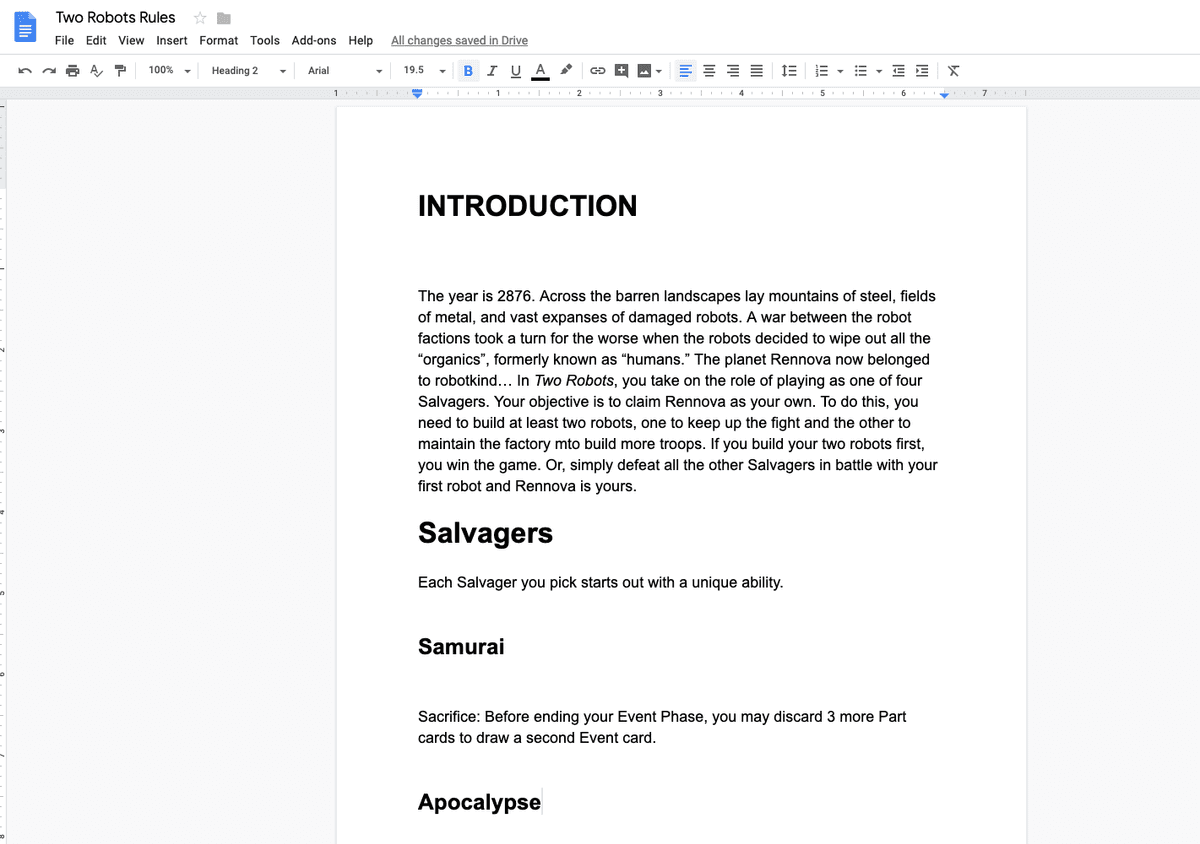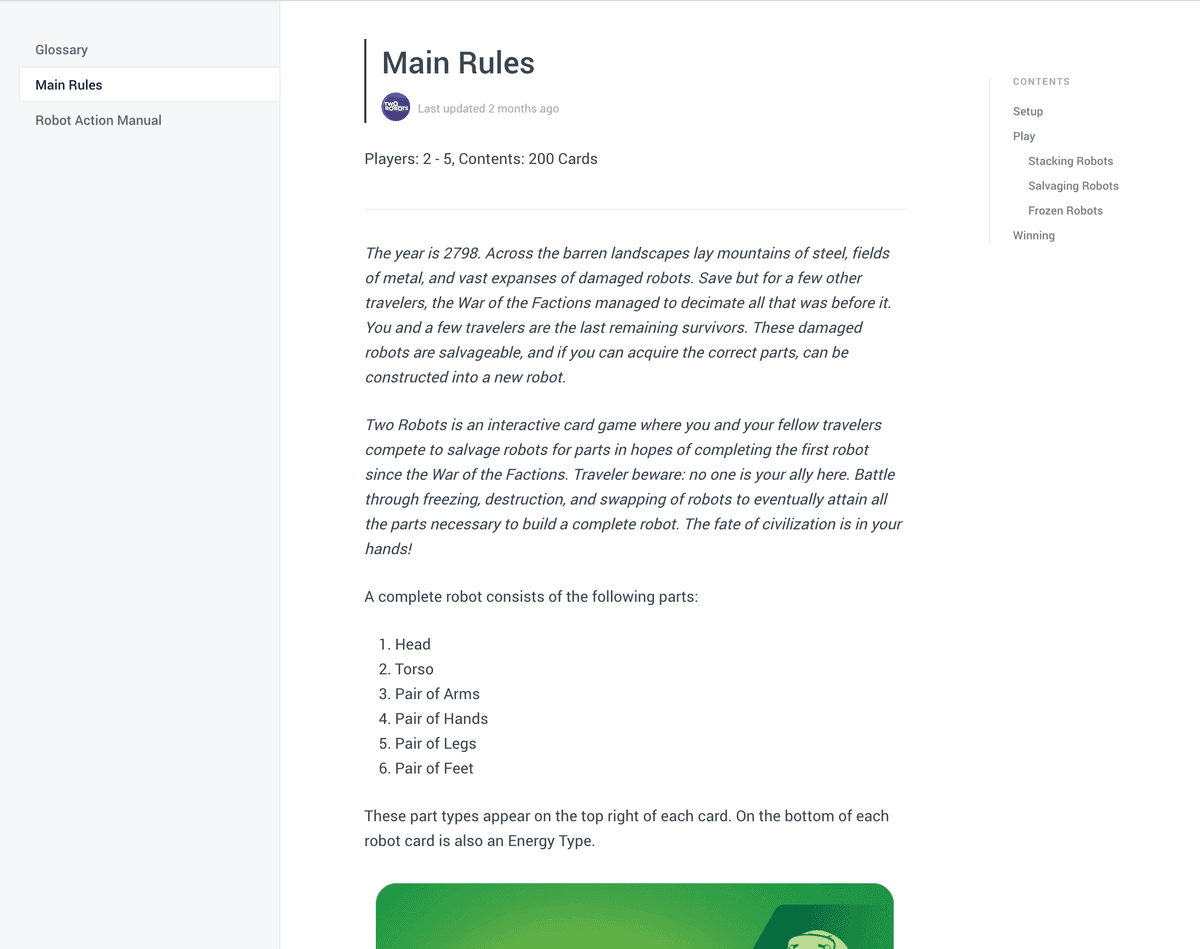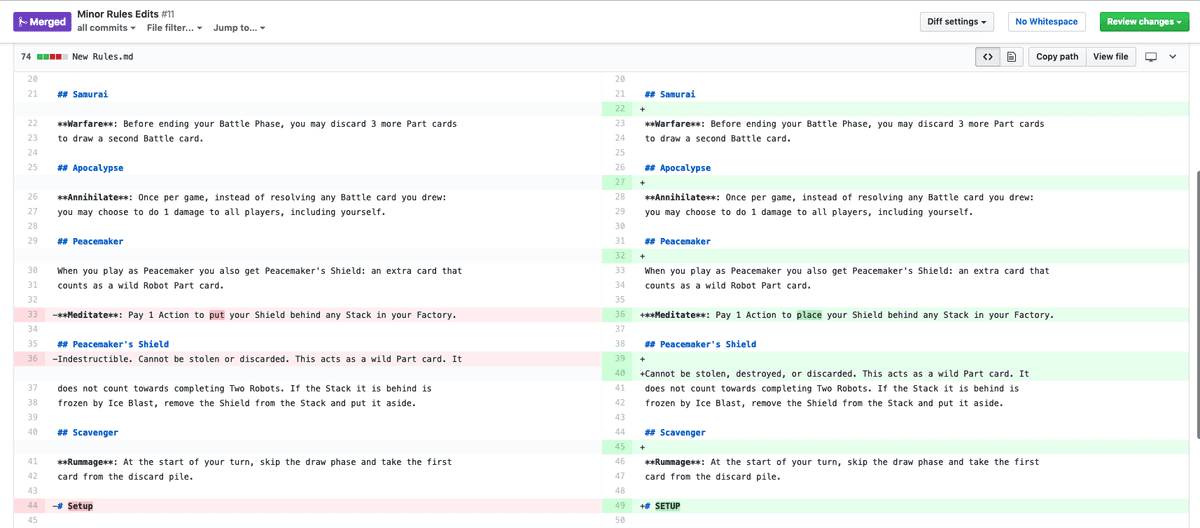The Art and Science of Writing Tabletop Game Rules

Hey Salvagers,
This past week has seen some tremendous growth within the Two Robots community. Our subscriber list is growing like crazy, and we have written and locked in our rules. If you are curious about what’s happening in our world, feel free to subscribe on our homepage here.
Where should I write my rules?
Although this seems super obvious, this is actually a really great question and one that we have asked ourselves countless times. I’ll be honest with you all, we have actually written our rules in three separate locations, switching between them until we found the place we liked the most. Crazy right!? As you may or may not know, Omar and I are both engineers, and like to have everything ordered precisely as well as be able to be reviewed well by the other person. Our first step into rule writing came with a shared Google Doc. Here’s an image below of what our first initial draft of the ruleset looked like.

We enjoyed Google Docs for the most part, and I would venture to say that this solution would fit the vast majority of game designers. However, I wanted to show you all some other ways that we have been keeping tabs on our rules. We next tried GitBook, to self contain all the rules and look nice.

Both these solutions worked well with GitBook definitely having an aesthetic compared to Google Docs. With that being said, there were some downsides to GitBook. Our editing flow was not as robust, and our review cycle was a lot slower. In Google Docs you can have someone review all your work which is something that we wanted. However, we found the reviewing and editing flow to be tedious and altogether time consuming in both platforms.
Drum roll please 🥁
After much deliberation, we actually just moved to a markdown file that we could both write in and review each other line by line. For us, this works well, we have the ability to review each other down to every word and make sure all the rules are clear and concise. So why all the big fuss around tooling for writing rules? Simply said, it is incredibly important to have someone reviewing you at all times. We wanted to get as granular as each individual word that was said. A lot can be told with an abundance of words, and even more can be shared by taking words away. We were looking for the perfect intersection of conciseness and clarity.

A Walkthrough Of Developing Thoughtful Game Rules
Let's talk some rules.
Here’s an example of a rule that we have finished for the setup part of our game:
- To start, remove both the purple-backed Action deck and the Red-backed Event deck from the box and place them in the middle of the playing area.
And this is what that text looked like when we first set out to write the rules:
- First, remove the deck from the box and place it in the middle of the playing area.
So, let’s dive into why we changed this. First off, it’s a little unclear that we actually mean both decks here. We didn’t even really notice we had this problem until we play tested with our rules alongside us. This is something I would definitely recommend. What we ended up doing was getting a friend to come over who has never played the game, and then read the rules to them during setup. This was extremely effective at catching errors and small, subtle changes that are needed to make the rules clearer.
We actually had a small iteration in between these two, where we just said "Purple-backed” and “Red-backed”. Changing this created a problem that became obvious with our play testers when the first question they asked was “What is the difference”. The subtlety of the wording is critically important to delivering a clear message as to what the rules of your game are.
With that being said — rules need to be skimmable. Let’s be honest, there are few people that read the full rulebook. That does not mean that your rules need to be brief, just that they need to be clear enough that reading half of them can get a person up and running immediately. How can we as game designers accomplish this?
Here are some surefire ways:
- Create a quick glossary that includes the winning condition
- Create a card that outlines in brief all the high level rules of your game. Think of it as a reference guide for your players to consult. This is implemented in a fair amount of games. Some implement it so well that people never read the rulebook! (Crazy right?)
- Have dedicated sections for Setup, Play, and Winning. Everything else is implementation details.
Alongside that, I think it's vitally important to point out relevant keywords within your rules. For instance, we use the term “Salvager” in place of player within our rules. It has a quick definition in our glossary (You guessed it: Player), and it is capitalized everywhere it is used. Capitalizing any important keywords will make it stand out to the reader that they are unique to the game. Other ways you could do this is with colors/bolding text, as long as you are consistent, your readers will understand.
Another thing to keep in mind when writing clear rules, is to always be as direct as possible. There is no need for unnecessary qualifiers when writing rules. A lot of adverbs and adjectives tend to sneak in when we are writing rules. It’s a natural human process to want to accentuate what we say. However, don’t do that when writing rules! You want to be straight to the point and as clear as possible. If your rule is “Draw five cards”, don’t say “Feel free to pick up five cards from the deck in the middle”.
Nothing will bug people that play your game more than unclear rules, or frivolous ones.
In Closing
- Playtest your rules by testing with a player that has never played before. What do they not understand? What do they think is difficult about the rules?
- Perfect rules are tricky, be as clear and concise as you can be.
- Ensure that your rules are detailed enough so they cover everything well, but also able to be skimmed by an impatient player
- Review every line that you write. Just because it makes sense to you doesn’t always mean it will to others
And finally,
Make your rules fun! They don't always have to read like a dictionary. Readers will love to see your creativity shine through your writing.
Got any feedback for us? We would love to hear from you. If you are interested in the progress that we are making, sign up for our subscriber list. This will give you access to some behind the scenes content (Blooper video coming soon), as well as our progress with the game.
PS. Our newsletter has really funny GIFs.
